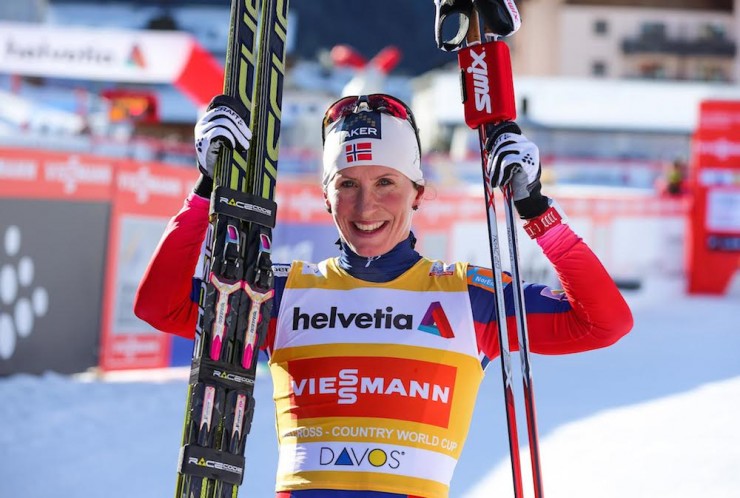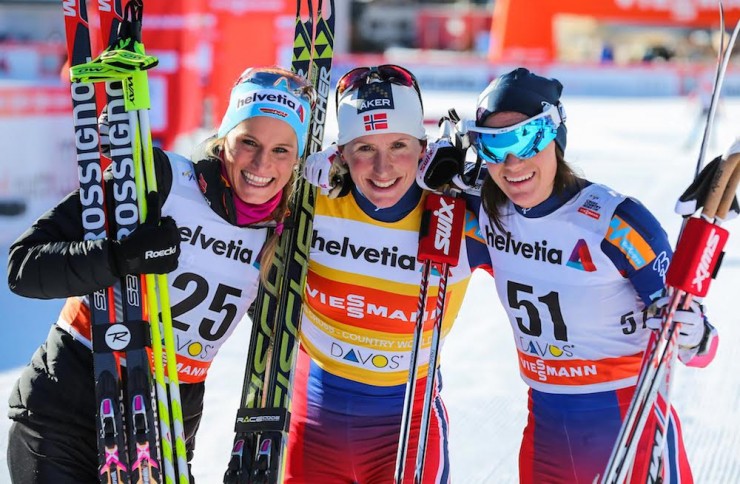
Heading into the women’s 10-kilometer freestyle individual start on Friday in Davos, Switzerland, one stat stuck out over the rest. Marit Bjørgen of Norway has not been beaten in a World Cup 10 k skate since Davos in December 2009, when she placed fourth. Since then, Bjørgen had won all five of the World Cup 10 k skate races she started.
In total, Bjørgen had racked up seven of those 10 k freestyle wins, and with a win on Saturday, she would tie former Czech Republic skier Katerina Neumannova with eight wins, according to a FIS press release. Besides them, no other competitor has more than three 10 k skate wins.
But Bjørgen hadn’t won a World Cup distance race yet this season; her teammate Therese Johaug had.
Depending on how the usual showdown shook out, Bjørgen or Johaug could lead the Norwegian women’s team to the longest winning streak in women’s World Cup history. Before Saturday, the Norwegian women had won nine straight World Cup races, not including stages (between Bjørgen, Therese Johaug and Ingvild Flugstad Østberg so far this season). A 10th-consecutive win would beat the Russian record, set during the nearly a decade ago between February and November 1995.
To top that off, Norway could add to its 14-race winning streak, including World Cup stages.
Johaug won the last 10 k skate held in Davos in February 2013 — which Bjørgen did not start. On Saturday, Johaug was seeking her sixth-straight distance win, in which she would equal the records of Norway’s Bente Skari (January-February 2003) and Italy’s Manuela Di Centa (February-March 1996). Bjørgen has yet to string together more than five consecutive wins.
Whether any of these women were aware or cared much about these stats was besides the point — on Saturday morning, Bjørgen and Johaug were out for a duel.
Because of the less-than-average snow in Europe, this event was originally scheduled to be held in La Clusaz, France, but was canceled then rescheduled last week for Davos. The majority of the course was a mixture of natural and manmade snow leading to an icy surface, which benefited the earlier starters.
“It was icy, so one could easily lose their skis from under them,” Bjørgen told NRK, according to a translation. “It was better to [ski] safe than to risk anything.”
As usual, Bjørgen in the overall World Cup leader’s bib, started last with the advantage of chasing down Johaug, who started a minute ahead of her. Judging Johaug’s start out of the gate, she looked primed to give Bjørgen a run, posting the fastest time at 2 k through 53 starters.
However, once Bjørgen blew through that checkpoint, she was 0.8 seconds faster.
“[My race] flowed very well. I managed to hit well and got the power down in skis,” Bjørgen said.

A surprise early leader, Germany’s Nicole Fessel, who started 25th, was 4.3 seconds faster than Johaug at the halfway point. Fessel bumped fellow German Claudia Nystad out of the leader’s chair after finishing 18.4 seconds faster than her, and Fessel would stay there until Bjørgen crossed the finish.
“I had perfect skis. It was a great today,” Fessel said. “The plan was to start fast and keep the pace high. I grew up in the mountains so I am quite good in downhills.”
She left three fast Norwegians, who started behind her, with a time to beat. Heidi Weng, Ragnhild Haga and Johaug all tried, but each of them would eventually end up short. The closest to Fessel, Weng came within 6.2 seconds of her at 7.8 k and finished 6.8 seconds behind her in second.
Bjørgen, who was fastest through each of the checkpoints, including a whopping 22.5 seconds over Fessel at 7.8 k, bumped them both down on the podium when she finished in 24:57.7 — 19.9 seconds faster than Fessel.
Johaug was 31.1 seconds off Bjørgen’s pace at 7.8 k, and at times, she appeared uncharacteristically cautious on her skis (including on an icy righthand downhill corner before a climb). At the finish, she was 20 seconds behind Fessel in fifth, and moved down one spot to sixth after Bjørgen crossed the line.
“It was very icy and I was consistently top of my skis,” Johaug told NRK. “I could not stand well enough on the skis.”
Alternatively, Bjørgen flew all over the course, up until the finish when she seemed to ease up in an effort to seal her victory without incident. There, she secured her sixth-straight 10 k skate win, and Fessel recorded her third World Cup podium in second. Weng took third, 26.7 seconds behind Bjørgen.
“I think today was my best skating competition,” Weng said. “I tried during the whole summer to improve my skating technique. I was skiing safe in the downhills. I was focused to finish on the podium. My plan was to start slower after the start and speed up in the second lap.”
Johaug ended up sixth (+39.9) after Haga in fourth (+35.4) and Nystad in fifth (+38.3). With two Germans in the top five, Fessel said their team result was promising.
“Finally we get salary for the good workout,” she told NRK. “We train so much and have had so many setbacks. We are not a cross-[country skiing] nation like Norway, and it is good to get to this. It gives us motivation.”
Norway has now won 10 of the last World Cup women’s events (not including Tour stages) since American Kikkan Randall won the freestyle sprint in Lahti last March.
“I had a very good feeling,” Bjørgen said. “The downhills were not so easy and I had to be careful not to lose the victory. I am very happy for the first distance World Cup victory this season.”



